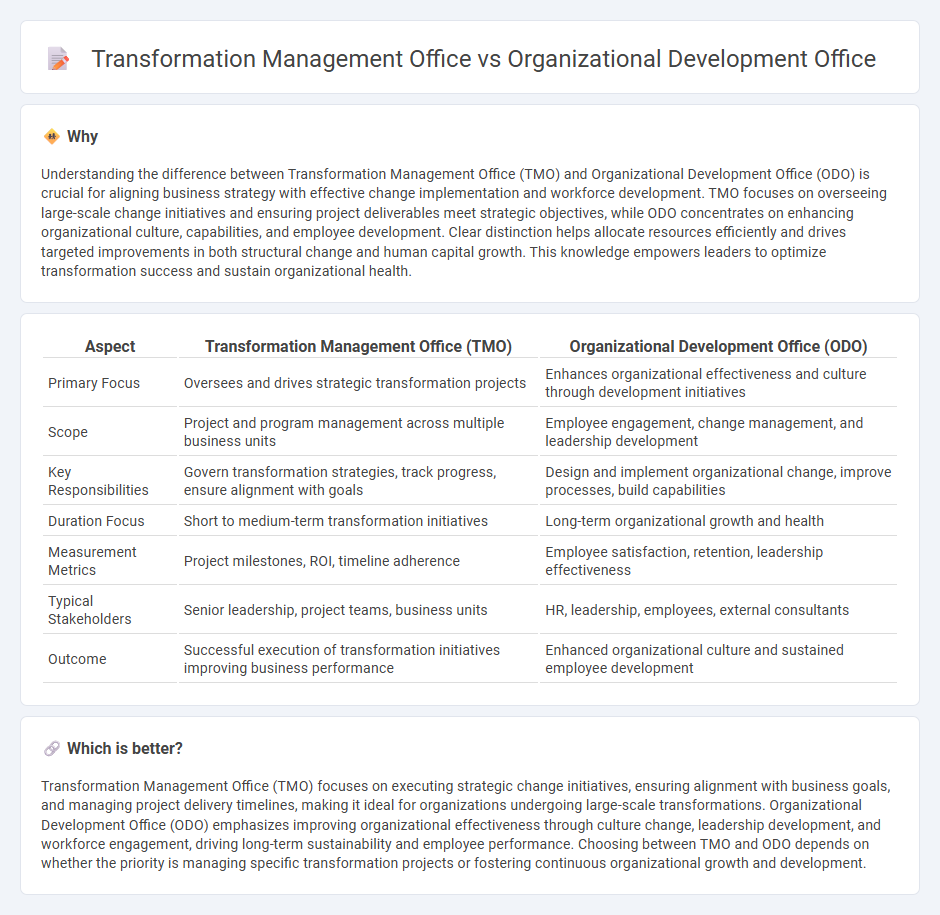
Transformation Management Office (TMO) specializes in overseeing strategic change initiatives, focusing on project execution, governance, and measurable outcomes. Organizational Development Office (ODO) emphasizes cultivating culture, enhancing employee capabilities, and aligning organizational structures to support sustainable growth. Explore how integrating TMO and ODO functions can drive comprehensive business transformation.
Why it is important
Understanding the difference between Transformation Management Office (TMO) and Organizational Development Office (ODO) is crucial for aligning business strategy with effective change implementation and workforce development. TMO focuses on overseeing large-scale change initiatives and ensuring project deliverables meet strategic objectives, while ODO concentrates on enhancing organizational culture, capabilities, and employee development. Clear distinction helps allocate resources efficiently and drives targeted improvements in both structural change and human capital growth. This knowledge empowers leaders to optimize transformation success and sustain organizational health.
Comparison Table
| Aspect | Transformation Management Office (TMO) | Organizational Development Office (ODO) |
|---|---|---|
| Primary Focus | Oversees and drives strategic transformation projects | Enhances organizational effectiveness and culture through development initiatives |
| Scope | Project and program management across multiple business units | Employee engagement, change management, and leadership development |
| Key Responsibilities | Govern transformation strategies, track progress, ensure alignment with goals | Design and implement organizational change, improve processes, build capabilities |
| Duration Focus | Short to medium-term transformation initiatives | Long-term organizational growth and health |
| Measurement Metrics | Project milestones, ROI, timeline adherence | Employee satisfaction, retention, leadership effectiveness |
| Typical Stakeholders | Senior leadership, project teams, business units | HR, leadership, employees, external consultants |
| Outcome | Successful execution of transformation initiatives improving business performance | Enhanced organizational culture and sustained employee development |
Which is better?
Transformation Management Office (TMO) focuses on executing strategic change initiatives, ensuring alignment with business goals, and managing project delivery timelines, making it ideal for organizations undergoing large-scale transformations. Organizational Development Office (ODO) emphasizes improving organizational effectiveness through culture change, leadership development, and workforce engagement, driving long-term sustainability and employee performance. Choosing between TMO and ODO depends on whether the priority is managing specific transformation projects or fostering continuous organizational growth and development.
Connection
The Transformation Management Office (TMO) and Organizational Development Office (ODO) are interconnected through their shared focus on driving change and enhancing organizational effectiveness. The TMO oversees strategic initiatives and project execution, while the ODO focuses on cultural shifts, leadership development, and employee engagement to support transformation goals. Their collaboration ensures aligned change management processes, optimized resource utilization, and sustainable transformation outcomes.
Key Terms
Change Management
The Organizational Development Office (ODO) primarily concentrates on enhancing organizational effectiveness through culture change, leadership development, and employee engagement, embedding change management into continuous improvement processes. In contrast, the Transformation Management Office (TMO) drives large-scale change initiatives and strategic transformations, focusing on project governance, stakeholder alignment, and managing resistance during major transitions. Explore the distinct roles and methodologies of ODO and TMO to optimize your organization's change management strategy.
Process Improvement
The Organizational Development Office (ODO) emphasizes process improvement by enhancing organizational structure, culture, and employee capabilities to drive long-term efficiency and adaptability. In contrast, the Transformation Management Office (TMO) focuses on managing large-scale change initiatives with strategic process redesign and technology integration to achieve rapid organizational transformation. Discover how integrating both approaches can optimize process improvement and sustain competitive advantage.
Strategic Alignment
The Organizational Development Office (ODO) primarily focuses on aligning an organization's culture, structure, and processes with strategic goals to enhance overall performance and employee engagement. In contrast, the Transformation Management Office (TMO) centers on overseeing and executing large-scale change initiatives to achieve strategic transformation objectives within set timelines and budgets. Explore the distinct roles and contributions of ODO and TMO in achieving strategic alignment for your organization.
Source and External Links
What Is Organization Development? - Organizational Development Office focuses on improving an organization's capability by aligning strategy, structure, people, rewards, and management processes through a systematic, long-range process driving effectiveness and performance improvement.
What Is Organizational Development? A Complete Guide - AIHR - The Organizational Development Office leads planned interventions and initiatives to manage change through stages such as contracting, diagnosing issues, intervening with action plans, evaluating results, and ensuring sustained transformation.
Institute of Organization Development-HRCI approved provider - Organizational Development Offices often offer certifications, organizational assessments, strategic planning, and interventions to enhance leadership, employee engagement, and culture, helping organizations lead change and improve effectiveness.
 dowidth.com
dowidth.com